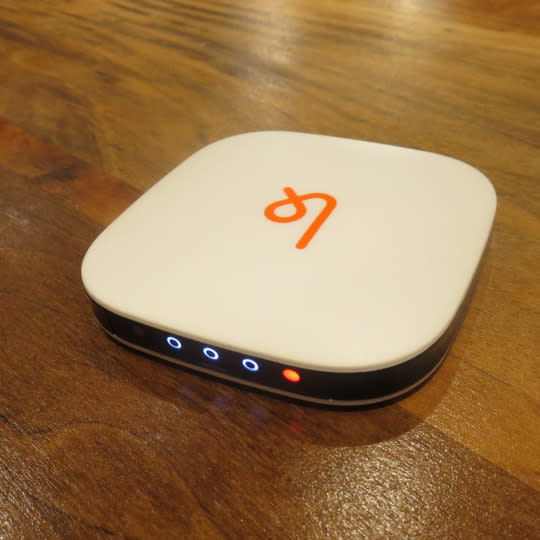Review: Karma Sells Unlimited Mobile Broadband — But Is That a Viable Business?

(Photo by Rob Pegoraro/Yahoo Tech)
Unlimited data on a WiFi hotspot has become the unicorn of wireless broadband — much sought-after, but rarely realized. But one company wants to change that.
In November, the Sprint reseller Karma Mobility introduced a surprising addition to its prepaid service: a $50 unlimited-data Neverstop plan that lets you download and upload at will over a Karma Go LTE hotspot (normally $149, on sale for $129 to new Neverstop customers).
The limits of “unlimited”
It’s been done before: In 2010, the long-gone Clearwire’s unlimited-data service impressed me. But more recently, the only way to get unlimited mobile data has been to confine it to a phone: Sprint and T-Mobile’s unlimited plans cap how much you can share via tethering.
New York-based Karma does, however, impose two lesser obstacles that set Neverstop apart from its older “Refuel” option (whereby you pay $9.90 to $14 per gigabyte of data): Downloads and uploads have a 5 Mbps speed limit, and you can only tether three devices at once.
(Karma’s WiFi setup requires a Web login, not a standard password sign-in, so browser-less gadgets like a Chromecast can’t be among those three.)
Sprint’s LTE is not the best — it was particularly slow during a November visit to Karma’s offices — but it can easily beat 5 Mbps. On the Go I’ve been testing, I’ve seen it top 15 Mbps several times in Washington, New York, and in between.
Then again, it wasn’t that long ago that 5 Mbps was unimaginably fast compared to most mobile broadband. So I had to try.
Fast enough
The verdict after a week of using Neverstop with a MacBook Air and an iPad mini 4: While 5 Mbps suffices for browsing, e-mail and updating an iPad’s apps, it leaves little cushion for streaming video.
I was able to watch a surprising amount of interruption-free HD on Amazon and Netflix. But hiccups with the Sprint connection or the Karma’s WiFi would drop the resolution to standard definition. At worst, I was left with blurry footage that reminded me of watching RealVideo over dialup in the 1990s.
Karma isn’t brushing aside such caveats. As CEO Steven Van Wel wrote when introducing the service: “It’s not practical for most people to use Neverstop as their only Internet connection, but if you’re a light user and looking to cut down on costs, you’re welcome to give it a try.”
It seems that Karma’s customers are. Since Neverstop’s debut November 5, it’s accounted for 70 percent of sales.
Is it viable?
That brings up a larger question: Can Karma — which must pay Sprint for every bit of the bandwidth its customers consume — afford to keep selling unlimited data?

Industry analysts I talked to were exceedingly skeptical.
“I haven’t looked at Karma much, but any unlimited deal is always on shaky ground, because the provider is always paying its suppliers at a per-unit rate,” said Jan Dawson, founder of Jackdaw Research. That is, Sprint isn’t selling Karma unlimited data — doing so would invite resellers to cannibalize its business.
“In theory, setting the price at the right level to begin with, and increasing it as necessary in response to increased usage over time, should help to prevent problems,” he continued. But more often, unlimited-data deals attract heavy users and force providers to tighten their restrictions.
Alex Besen, founder of the Besen Group, said his study of wholesale wireless pricing yielded the same conclusion: “We don’t believe Karma can sustain their new pricing for a long time.”
During my November visit, chief operating officer Robert Schouwenburg admitted that Neverstop’s viability would depend on customer behavior: “It all depends on what users are going to look like.“
I invited Karma to point me to analysts bullish on its prospects but did not hear back. It also wouldn’t say if it’s making money.
Don’t count them out
You may find reasons for confidence in Karma’s record. This company has overcome earlier obstacles since its 2012 founding, including a seven-month delay in shipping the Go hotspot that replaced an earlier model tied to Sprint’s now-defunct Wimax broadband.
The Go itself is a well-designed little pod, with simple controls (via Web, iOS and Android apps) and even automatic e-mail notifications when its battery gets low. With a battery life of about five hours, those missives do arrive often, but you can always keep it plugged in.
And Karma has shown with its Refuel service that it can provide an effective bandwidth alternative for intermittent use. Refuel’s sharing feature — every time somebody hops on your Karma hotspot and signs in to get 100 MB of free data, you get the same 100-MB freebie — may even make it a zero-cost proposition for less-frequent users.
(If somebody borrows your Neverstop connection, you get a $1 credit on your next month’s bill. Or you can switch back to Refuel and use that to buy that plan’s faster bandwidth.)
I also know many of you are sick of having to choose between local cable and phone monopolists for broadband, and are maybe thinking Karma represents a viable alternative. I want to believe. But before you fire Big Telecom and throw in with Karma, you have to ask yourself: Do you feel lucky?
Email Rob at rob@robpegoraro.com; follow him on Twitter at @robpegoraro.
